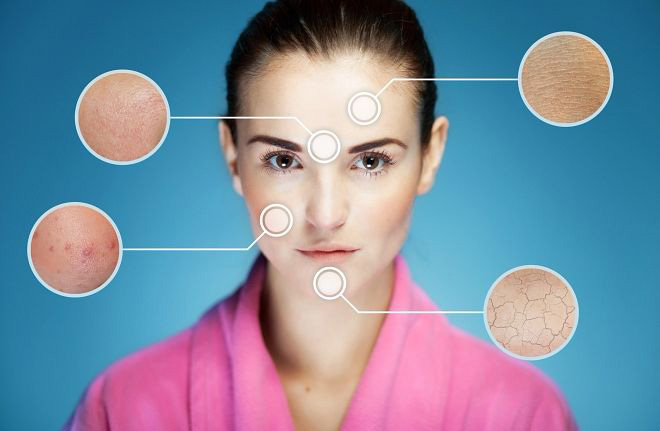
A short guide to some of the most common skin conditions.
Vitiligo
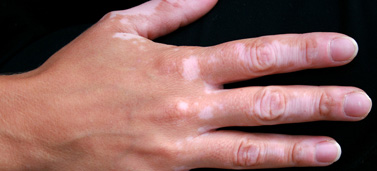
Vitiligo causes pale white patches on the skin that vary in size and can occur anywhere.
They are more noticeable on areas that are exposed to sunlight, such as the face and hands, and on dark or tanned skin. Vitiligo on the scalp can make your hair go white.
Vitiligo is a long-term condition. It's not contagious. You should see your GP to if you suspect vitiligo.
Treatment aims to improve your skin's appearance, and includes:
Cold sores
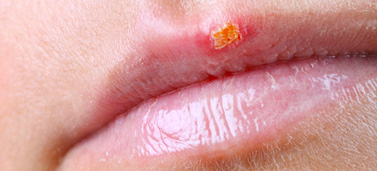
Cold sores are small blisters that develop on the lips or around the mouth, caused by the herpes simplex virus.
They often start with a tingling, itching or burning sensation around your mouth. Small fluid-filled sores then appear, usually on the edges of your lower lip.
Cold sores usually clear up without treatment within 7 to 10 days, but antiviral creams are available from pharmacies over the counter. These can help ease your symptoms and speed up the healing time.
Hives (urticaria)
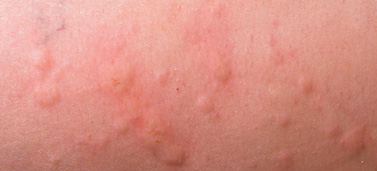
Urticaria – also known as hives, weals, welts or nettle rash – is a raised, itchy rash. It may appear on one part of the body or be spread across large areas.
In many cases, you don't need any treatment because the rash gets better within a few days.
If the itchiness is uncomfortable, antihistamines can help and are available over the counter at pharmacies.
See your GP if your symptoms don't go away within 48 hours.
Impetigo
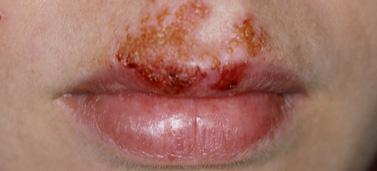
Impetigo is a very contagious skin infection that causes sores and blisters. There are two types:
It's more common in children, but can affect anyone.
The infection is likely to clear up by itself within three weeks, but it's a good idea to see your GP for a diagnosis as the symptoms are similar to other, more serious conditions.
Your GP can also prescribe antibiotic cream or tablets to get rid of it quickly.
Itching
Itching can affect any area of the body. Mild, short-lived itching is common, but it can sometimes be severe and frustrating to live with.
There are things you can do that may help, including:
Antihistamine and steroid cream may help relieve itching caused by certain skin conditions.
Psoriasis
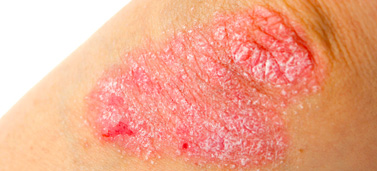
Psoriasis typically causes flaky red patches of skin covered in silver scales. The patches usually appear on the elbows, knees and the lower back, and can be itchy or sore.
For some people, psoriasis is just a minor irritation, but for others it can have a major impact on their quality of life.
People with psoriasis usually have periods when they have no or mild symptoms, followed by periods when symptoms are more severe.
Most people are treated by their GP, but you may be referred to a skin specialist called a dermatologist if your psoriasis is severe.
Although there is no cure for psoriasis, treatments can improve your symptoms. They include:
Ringworm
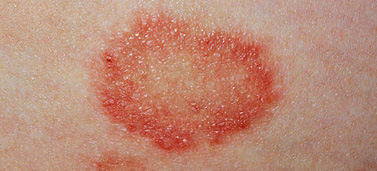
Ringworm is not a worm, but a contagious fungal infection that typically appears on the arms and legs, although it can appear almost anywhere on the body. It causes a red or silvery scaly rash in the shape of a ring.
Anyone can get ringworm, but it's more common in children.
You can treat ringworm with antifungal creams, powders or tablets, which are available over the counter from a pharmacy.
You may need to see your GP if you aren't sure it's ringworm, or if the infection doesn't clear up after using a pharmacy treatment for two weeks.
Atopic eczema
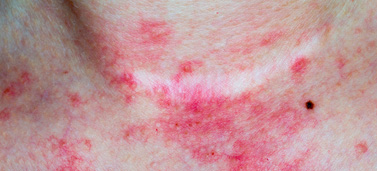
Atopic eczema, also known as atopic dermatitis, is the most common form of eczema and makes your skin itchy, red, dry and cracked.
It's a long-term condition in most people, although it can improve over time, especially in children, who often grow out of it.
It can affect any part of the body, but most commonly affects:
Treatment, which includes using moisturisers and topical steroids, can help relieve symptoms.
If you’re concerned with your beauty , but financial issues are keeping you awaay from acting on it, keep in mind that Alale company present the best experts as wellas the best and most reliable beauty centers in iran.
Submit Comment